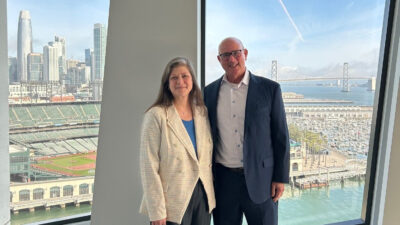Women’s Leadership: Q&A with Sutter Health Executive Christina Oh
With excitement growing for the Bay Area Council’s inaugural Women’s Leadership Summit presented by Sutter Health on Wednesday, Oct. 2 aboard the historic Klamath, we sat down with summit Co-Chair and Sutter President of Greater San Francisco Christina Oh recently to learn more about her, about some of Sutter’s key priorities and about expanding opportunities for women.
Christina, your career has taken you from the West to the East Coast and back again. Can you share some key moments that shaped your journey in healthcare?
Certainly. My healthcare leadership career has spanned 15 years across three health systems in South Carolina, Arizona and California, culminating in joining Sutter Health almost one year ago. But my journey began with inspiration from my grandmother, a public health nurse who helped found a clinic in southern West Virginia that is still in operation today. She was a trailblazer at a time when those kind of leadership positions weren’t common for women. As an adult, the key moments that have shaped my journey in healthcare have been my own personal health challenge, leading during COVID and losing a dear friend to cancer. Through each of these experiences, I’ve been reminded that the work we do in healthcare is infinitely worthwhile and WHO we do this work with matters. I believe that the most important work I can do as a leader is to develop future leaders and make it easier for patients to access healthcare.
You’ve overseen significant developments at Sutter Health, including the upcoming Mission Bernal Care Complex. That’s a significant investment—can you explain the thinking behind it?
In a word: access. Across Sutter Health, we work every day to make sure patients have access to the quality care they need, when and where and how they need it. The Mission Bernal investment is a great example. It’s a five-story, 129,000-square-foot comprehensive advanced neurological and neurosurgical care complex adjacent to our existing CPMC Mission Bernal campus. It will officially welcome patients in 2028.
Patients will be able to come to this location and visit their specialist, receive diagnostic lab and imaging, as well as outpatient procedures, all in one complex. The center will also house the Ray Dolby Brain Health Center and Forbes Norris MDA/ALS Research and Treatment Center, and patients will have access to the latest research and clinical trials. Comprehensive, advanced care at one location will create a more convenient, coordinated experience for patients.
This is the first project in our larger planned growth strategy for San Francisco over the next five years, which will ultimately result in nearly a billion dollars in investment dollars across the city.
Physical capacity is one piece of the access question; having enough physicians and other healthcare workers is another. Can you speak to Sutter Health’s efforts to expand the healthcare workforce?
Absolutely—Sutter is committed to being a leader on this issue. Our organization-wide strategy includes investing in new and enhanced care sites, weaving in seamless digital solutions, recruiting new physicians and expanding pathways for the next generation of caregivers with an emphasis on building a workforce that reflects the diversity of those we serve.
In fact, we’re on pace to become the largest community-based healthcare training institution in Northern California. Some of the ways we’re doing that include significantly expanding our Graduate Medical Education programs, with a plan to train 1,000 residents and fellows per year by the end of the decade. And in addition to expanding our in-house programs for nurses, advanced practice clinicians, medical assistants and others, we’re also creating new academic partnerships to expand medical training offerings, including:
- In December 2023, we cemented a 10-year partnership with Charles R. Drew University of Medicine and Science, one of only four Historically Black Medical Schools in the country. We are funding 25 full scholarships – five students in five cohorts – and an incubator lab to accelerate health equity advancements.
- We have also partnered with San Francisco State University to provide eight clinical placement slots for SF State’s Accelerated Bachelor of Science in Nursing Program (BSNA), allowing the university to enroll 25% more students in the program.
- We recently launched the NextGen Scholars program, designed to provide educational and healthcare employment opportunities to high school students. Sutter has teamed up with Los Rios Community College District and invested $1.7 million into a pilot program at Folsom Lake College in fall 2024 – with the goal of expanding the program to other regions and training 5,000 students by 2030.
You are co-chairing the Bay Area Council Women’s Leadership Summit this year. Can you speak to what drew you to the role?
Early in my career, I had leaders and mentors who challenged, supported and showed me what was possible in my leadership journey. That experience fed my passion for challenging my own team to break the mold of what they think a leader “should” look or sound like. It’s rooted in the personal and the professional for me, from parents who gave me the willingness to change and grow to executive development programs that emphasized strength-based leadership. That’s part of what I hope comes from the Women’s Leadership Summit, a recognition of the value of embracing one’s own strengths rather than trying to fit into a predefined mold. One of the ways that’s taken shape for me is that I’ve been able to lean into my empathetic side, which has made me a better leader in a purpose-driven field like healthcare, where empathy is at the heart of so much of what we do.
On a related note, you’ve been recognized for developing a “people-first” culture. How do you foster that environment among your teams?
Our mission at Sutter Health is caring for our patients first and our people always. Our people are our greatest asset. We are investing in more training and career development opportunities, and we’re building an engaged culture steeped in diversity, equity and inclusion where all are valued and respected. I prioritize building strong, personal connections, fostering growth, and recognizing the unique contributions of each individual. My leadership philosophy is grounded in accountability and high standards, but it’s also about providing support and opportunities for development. By investing in our team, we’re not just building a stronger organization; we’re building a better future for everyone.





